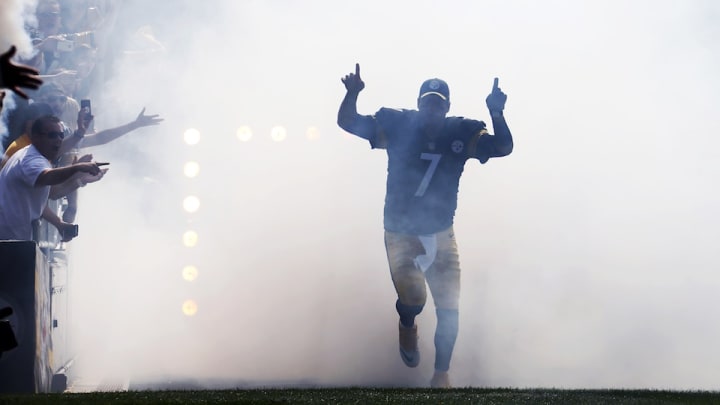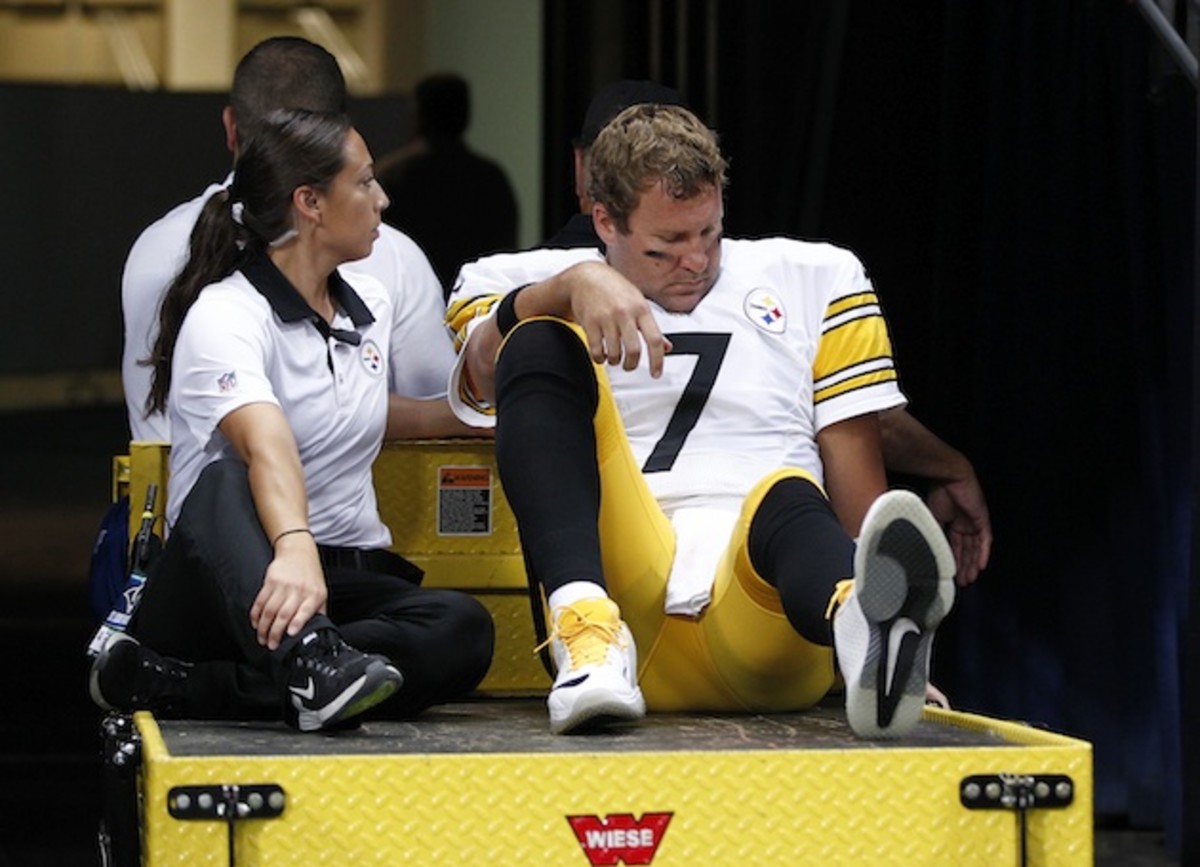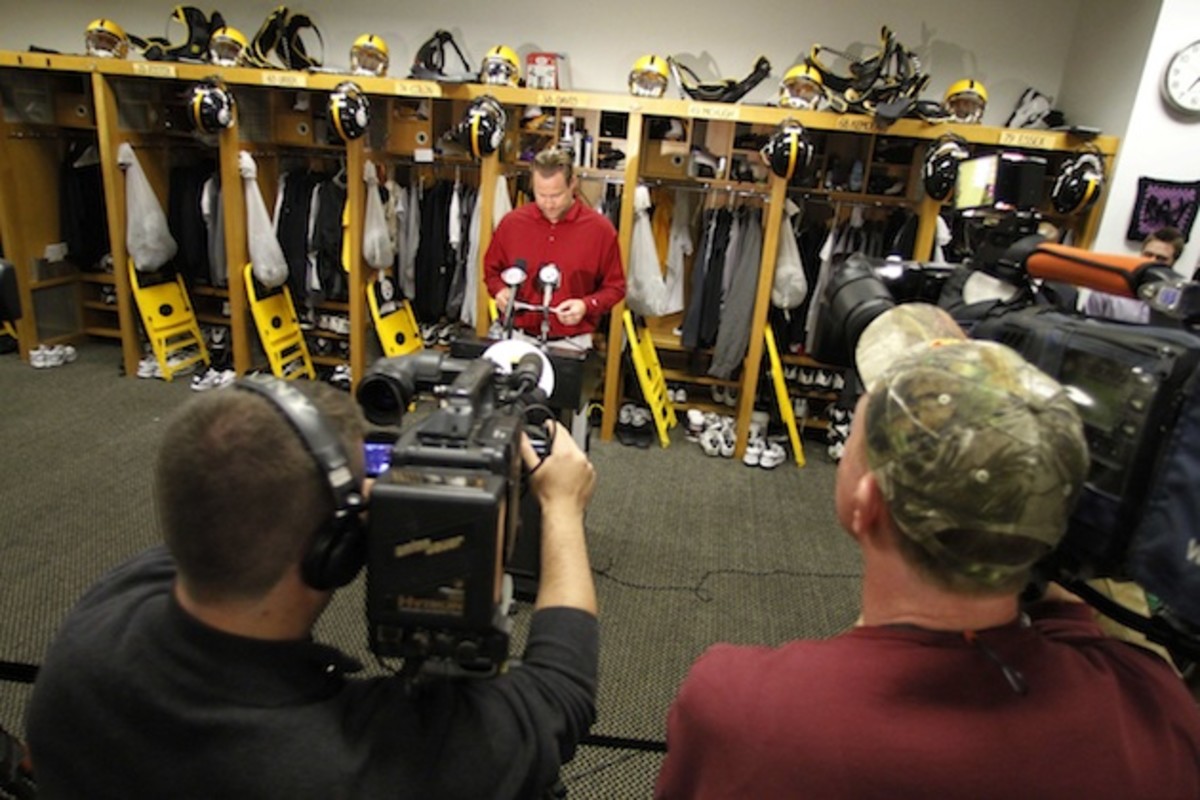When it comes to Big Ben, seeing is believing both the good and the bad

He looks like he originated in some seven-year-old boy’s daydream about his dad. I was convinced until about fifth grade that my father was the strongest man alive. It turns out I was mistaking him for Ben Roethlisberger the whole time. He’s the rare quarterback who solves one of the position’s essential problems — the need to release the ball before some 300-pound lineman maims you — by being blithely unconcerned with it, as if he’s overcome a fear of heights by falling off a few buildings and landing on his feet.
When his offensive line splinters, he likely hears the same alarm bells his colleagues do, but Big Ben interprets them differently, which is to say he ignores them. This is the quintessential Roethlisberger image: standing in an imploded pocket, ball chest-high, a linebacker’s arms belted around his hip. He’s not avoiding a sack, really; he’s not shifty like Tony Romo, or a scrambler like Colin Kaepernick. Rather, he’s merely willing himself to stay upright just long enough to find an open receiver. His superpower is steering into the skid.

It’s delightful to watch, in a distinctly footballish way, which is worth mentioning because, like goalkeepers in soccer and pitchers in baseball, quarterbacks often seem to be playing a different sport than the rest of the players on the field. Everyone else is locked in a contest of speed or strength — the wide receiver beating the corner to a spot, the defensive end bowling over the tackle. The quarterback’s job is to make sense of it. He’s not Descartes, out to parse the finer points of existence, though the gig certainly is somewhat contemplative in nature. If, in those three seconds before the ball’s released, the quarterback can be seen as acting purely on instinct, then it is at least instinct that resembles thinking. It is the processing of ricocheting data points. No, that guy’s covered. Bah, the safety’s on top of that route. I gotta get rid of this thing soon. Wait! There’s my tight end!
Roethlisberger’s game is a whole different mental breed— as if he once tried thinking through a particular play’s sequence, and decided it wasn’t for him. As Peyton Manning drops back, you can almost hear the sheets of graph paper rustling as he flips them through his head. With Roethlisberger’s, I imagine his mind absorbing only the echoes what’s happening around him: bodies thudding against each other; “Life Is A Highway” blasting at full volume. There’s a charming foolhardiness to him, like his only plan is to scrap the one in front of him, for no other reason than it’s more fun when everything turns to hell.
This temerity explains a lot about him: the helmetless motorcycle crash that shattered his face and severed a major artery in 2006; his near-constant football injuries; his insistence on playing through them. This hat. In 2011, NFL Films caught Mike Tomlin, in a game the Steelers were leading handily, telling Roethlisberger to stop playing recklessly, fearing his quarterback was going to get hurt. Roethlisberger’s response: “I only know how to play one way, coach, but I’ll do what I can.” The guy does what he feels.
Not a little harrowingly, the multiple sexual assault charges against him jibe with Roethlisberger’s public persona. In 2008, he met a casino hostess, asked her to come to his room to repair a malfunctioning television, then allegedly barred her from leaving and forced himself on her. Two years later, a college student in Georgia accused him of sexual assaulting her in a nightclub bathroom while his bodyguard ran interference. No charges were brought against Roethlisberger in either situation, but both stories turn the stomach in the way these incidents always do, but even apart from the grave crimes themselves, they paint Roethlisberger as a malignant, predatory doofus. The star quarterback of the Pittsburgh Steelers couldn’t get a woman to visit his hotel room without lying to an employee about a busted TV set? What was he doing partying with a girl who couldn’t even drink legally? Roethlisberger’s behavior makes him somewhat enigmatic, and that can be unsettling
*****

As is his wont, Roethlisberger is pushing the Steelers to clear him for this Sunday’s game against the Chiefs. Two weeks ago, he sprained his left MCL and bruised a bone—a pair of injuries that were supposed to keep him out at least a month. Yet here he is once again, "throwing the ball well" and "relatively pain-free,"—ready, willing, and “half”-able to play on a bum leg, if only his bosses will let him. The latest news out of Pittsburgh is that he's practicing but still highly questionable for Sunday.
The Legend of Big Ben DVD the Steelers will sell for $39.95 when Roethlisberger announces his retirement will contain an hour-long segment of all the times he bent behind center with a throbbing shoulder or a sore foot. Leading his team down the field in the fourth quarter while looking, between plays, as if his appendix had exploded. This is the thing about Roethlisberger that so pleases the square-jawed ex-players on NFL studio shows.
What perseverance! What commitment!
Those are fine things to admire in an athlete, of course. But even “grit” and “taking one for the team” seem like concepts too high-minded for Roethlisberger. On the Wednesday after he was diagnosed with the MCL sprain, Big Ben was asked when he wanted to return. His response?
“Thursday.”
It was a joke, but one imbued with truth: Roethlisberger is borderline tunnel-visioned in his desire to play, no matter the rust or risk. Truth told, it’s not a stretch to see this as very particular brand of stupidity, the flagrant disregard for his own well-being hinting at an almost cavemanish abandon. Seen in one light, Roethlisberger is absurdly brave — a football player’s football player, and a Hall of Fame one at that.
In another, he’s dumb-tough, and only footnote else.
*****

I go back and forth on whether any athlete, even one who spends a decade-plus in the public eye, can ever truly be knowable. Being able to discern the contours of someone’s personality and character from behind the fogged glass through which we view these players—it seems implausible. Despite that, I feel a specific way about Aaron Rodgers (would shop at the Gap if his publicist let him, loves pranks); about Richard Sherman (dragoons friends into one-sided discussions of books only he has read). Part of being a fan is pondering the inner lives of players, building them out in your head so as to make them more intelligible. We’re empathetic animals. We want to connect with people who fascinate us, even if the connection is illusory.
We have a lot of source material with which to build these connections — connections that are, at once, too much and not enough. Over time, athletes are rendered sharper in some respects (Eli Manning is not afraid to throw an interception, for instance) and hazier in others (Is Eli unflappable or just affectless?). The familiar player becomes an exquisite corpse: the hundreds of games he plays, the thousands of quotes he gives, and the millions of opinions people hold about him all layered on top of each other like eons of rot. Even if you’ve got the One True Unified Theory of Eli Manning — have him pegged right down to the thoughts he has when he’s shaving in the morning — you can’t prove it, to yourself or anyone else.
And yet, I still think Ben Roethlisberger is that strongest dad in the world. I think he plays his position like no one else. I think he fudges his golf scores, that he likes superhero movies. I also think he is capable of awful things. I think he’s moronic, stubborn, and selfish, and that, in a way, those traits serve him well on a football field. He’s a stranger to me, but I can imagine what he’s like when he’s at home, how he treats his friends.
In dim light, sometimes our minds will fill in images our eyes can’t complete by themselves. Maybe it’s impossible for me to know Big Ben, but I feel like I can see him.

